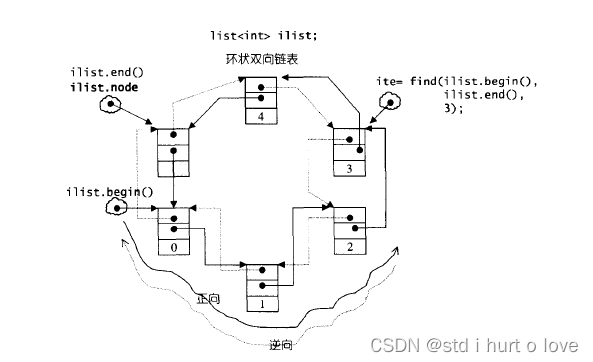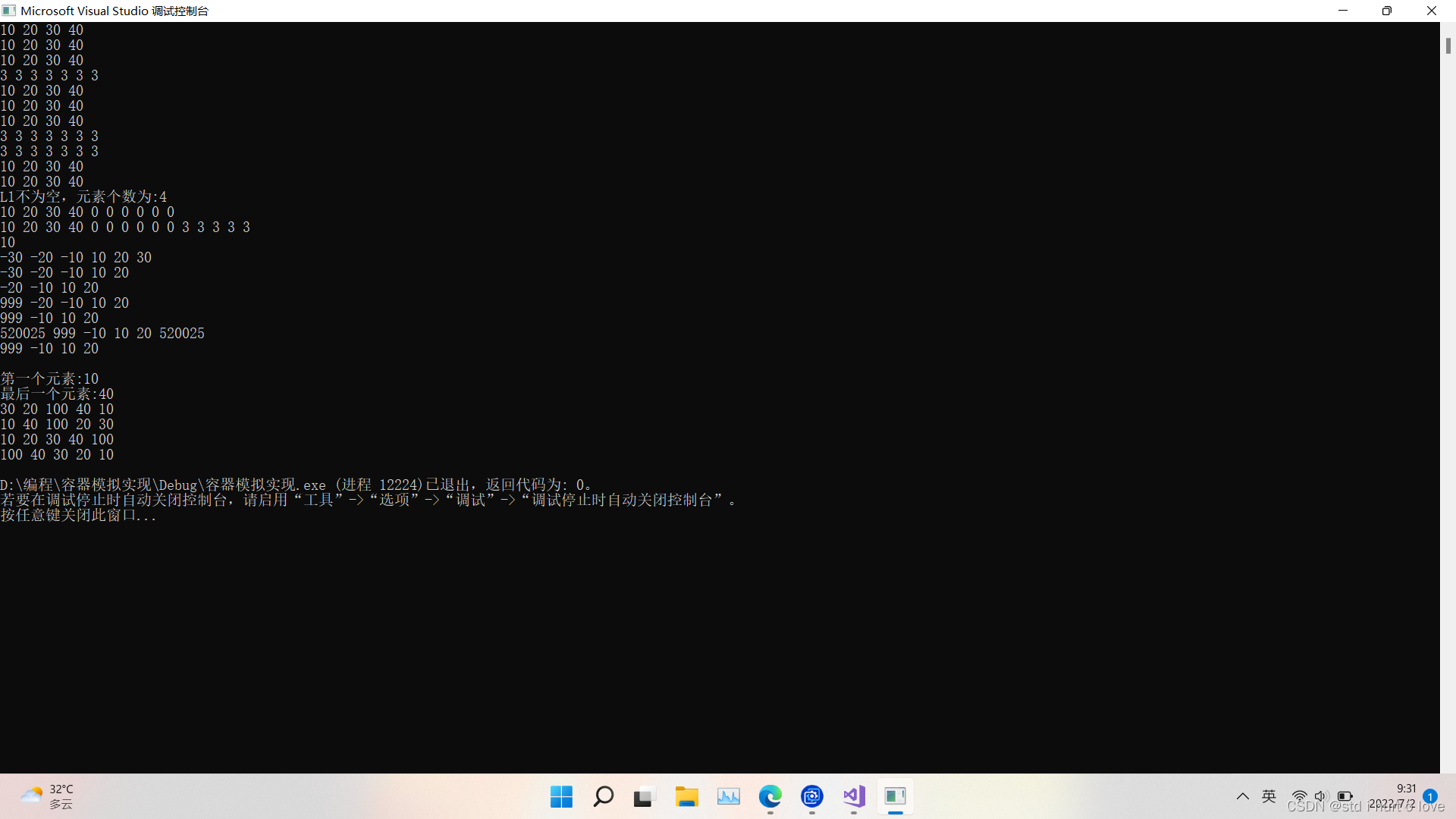List容器
一、list容器基本概念
- list容器使用链表存储,链表是由一系列节点构成,每个节点都有自己的存储空间。
- list容器中的链表是双向环状链表链表,其尾节点指向头节点

二、链表节点结构体
template<typename T>
struct ListNode
{
ListNode<T>*_prev;
ListNode<T>*_next;
T _data;
};
使用模板,包含一个前指针,一个后指针,和一个数据域
三、迭代器构建
//Ref指T&引用,Ptr指T*指针,采用三个参数是为了便于const迭代器构建,只需在后两个参数前加上const限定即可,不必重写一个
template<typename T, typename Ref, typename Ptr>
class ListIterator
{
public:
ListNode<T>*_node;
typedef ListNode<T> Node;
typedef ListIterator<T, Ref, Ptr> self;
ListIterator(Node*node)//构造函数
{
this->_node = node;
}
Ref operator*()//解引用
{
return this->_node->_data;
}
Ptr &operator->()//指针访问
{
return &(this->_node->_data);
}
self&operator++()//前置++
{
this->_node = this->_node->_next;
return *this;
}
self&operator++(int)//后置++
{
self temp(*this);
this->_node = this->_node->_next;
return temp;
}
self&operator--()//前置--
{
this->_node = this->_node->_prev;
return *this;
}
self&operator--(int)//后置--
{
self temp(*this);
this->_node = this->_node->_prev;
return temp;
}
bool operator!=(const self&it)
{
return this->_node != it._node;
}
bool operator==(const self&it)
{
return this->_node == it._node;
}
};
这是一个双向迭代器,即可正向访问,也可反向访问,因为重载了++和–
四、list类成员、命名及构造函数
public:
typedef ListNode<T> Node;
typedef ListIterator<T, T&, T*> iterator;
typedef ListIterator<T, const T&, const T*> const_iterator;
private:
Node*_head;
void CreatHead()
{
this->_head = new Node;
this->_head->_prev = this->_head->_next = this->_head;
}
私有成员为一个头指针,简化模板迭代器命名,CreatHead在构造函数中多次用到,简化为一个函数,避免重复代码
以下函数均在类外实现
template<typename T>
mlist<T>::mlist()//无参构造
{
this->CreatHead();
}
template<typename T>
mlist<T>::mlist(iterator begin, iterator end)//迭代器构造
{
this->CreatHead();
while (begin != end)
{
this->push_back(*begin);//采用类内函数调用实现,减少代码量
++begin;
}
}
template<typename T>
mlist<T>::mlist(size_t n, const T & elmn)//传入n个elmn
{
this->CreatHead();
for (size_t i = 0; i < n; i++)
this->push_back(elmn);
}
template<typename T>
mlist<T>::mlist(mlist<T> & list)//拷贝构造
{
this->CreatHead();
this->assign(list.begin(), list.end());
}
五、assign()函数
赋值函数
template<typename T>
void mlist<T>::assign(iterator begin, iterator end)
{
this->CreatHead();
this->insert(this->begin(), begin, end);
}
template<typename T>
void mlist<T>::assign(size_t n, const T & elmn)
{
this->CreatHead();
for (size_t i = 0; i < n; i++)
this->push_back(elmn);
}
迭代器的赋值函数还可以有const的版本,这里就不在多写,过于麻烦,这样,insert函数也要写const版本,很多函数都要在写个const版本,这就是个只读限定,防止数据被修改
六、重载=号运算符
template<typename T>
mlist<T> & mlist<T>::operator=(mlist<T> & list)
{
this->CreatHead();
this->assign(list.begin(),list.end());
return*this;
}
用assign赋值,返回本身
七、swap()交换函数
template<typename T>
void mlist<T>::swap(mlist<T> & list)
{
std::swap(this->_head, list._head);
}
调用std的swap交换对象中的头节点即可实现交换
八、size()函数和empty()函数
template<typename T>
size_t mlist<T>::size()
{
size_t count = 0;
for (mlist<T>::iterator it = this->begin(); it != this->end(); it++)
count++;
return count;
}
template<typename T>
bool mlist<T>::empty()
{
return this->begin() == this->end();
}
遍历链表计数
头尾相等为空
九、resize()函数
指定链表长度
template<typename T>
void mlist<T>::resize(size_t n, const T & elmn)
{
size_t len = this->size();
if (n <= len)//缩小删除
{
for (size_t i = n; i < len; i++)
this->pop_back();
}
else
this->insert(this->end(), n - len, elmn);//增大插入元素
}
现在想想不用写两个,用一个默认值(声明与定义只能标明一处,这里默认为0)实现,避免函数重载
十、头尾的删除、增添、取值
template<typename T>
void mlist<T>::push_back(const T & elmn)
{
insert(this->end(), elmn);
}
template<typename T>
void mlist<T>::pop_back()
{
this->erase(--this->end());
}
template<typename T>
void mlist<T>::push_front(const T & elmn)
{
this->insert(this->begin(), elmn);
}
template<typename T>
void mlist<T>::pop_front()
{
this->erase(this->begin());
}
template<typename T>
T & mlist<T>::front()
{
return this->begin()._node->_data;
}
template<typename T>
T & mlist<T>::back()
{
return (--this->end())._node->_data;
}
template<typename T>
const T & mlist<T>::front() const
{
return this->begin()._node->_data;
}
template<typename T>
const T & mlist<T>::back() const
{
return (--this->end())._node->_data;
}
插入和删除都用insert和erase去实现(之前还傻呼呼都写一遍),这里有const版本的,如果直接传入常量,会调用const版,传入变量,会调用非const修饰的函数.注意end要先减1才能取得最后一个元素。
十一、insert()函数
template<typename T>
typename mlist<T>::iterator mlist<T>::insert(iterator pos, const T & elmn)
{
Node*node = new Node, *Pos = pos._node;
node->_data = elmn;
node->_next = Pos;
node->_prev = Pos->_prev;
Pos->_prev->_next = node;
Pos->_prev = node;
return iterator(node);
}
template<typename T>
void mlist<T>::insert(iterator pos, size_t n, const T & elmn)
{
while (n--)
{
this->insert(pos, elmn);
}
}
template<typename T>
void mlist<T>::insert(iterator pos, iterator begin, iterator end)
{
while (begin != end)
{
this->insert(pos, begin._node->_data);
begin++;
}
}
这次终于明白迭代器返回类型的函数写在类外为啥会报错了,没有指明迭代器是模板名,如让面第一个函数,加个typename就好了。
因为是双向指针,插入有点麻烦,但很好理解,让插入位置的前一个节点的next指向node,node的前指针指向插入位置前一节点,node的next指向插入位置节点,插入位置节点的prev指向node,完成,但需要靠插入位置节点的前指针引导设置,要注意设置顺序。
十二、erase()、clear()和remove()函数
template<typename T>
void mlist<T>::clear()
{
this->erase(this->begin(), this->end());
}
template<typename T>
typename mlist<T>::iterator mlist<T>::erase(iterator begin, iterator end)
{
iterator it = begin;
while (it != end)
{
it = this->erase(it);//这里erase的返回值派上了用场,更新i的值
}
return it;
}
template<typename T>
typename mlist<T>::iterator mlist<T>::erase(iterator pos)
{
Node*Pos = pos._node;
if (pos == this->end())//到尾部无需删除
return this->end();
Node*node = Pos->_next;
Pos->_prev->_next = node;
node->_prev = Pos->_prev;
delete Pos;
Pos = NULL;
return iterator(node);
}
template<typename T>
void mlist<T>::remove(const T & elmn)
{
for (mlist<T>::iterator i = this->begin(); i != this->end(); i++)
{
if (i._node->_data == elmn)
i=this->erase(i);//这里也要注意更新i值
}
}
十三、sort()函数
template<typename T>
void mlist<T>::sort()
{
for (iterator i = this->begin(); i != this->end(); i++)
{
iterator min = i, ret = i;
for (iterator j =ret++; j != this->end(); j++)
if (min._node->_data > j._node->_data)
min = j;
if (min != i)
std::swap(min._node->_data, i._node->_data);
}
}
我实力有限,拿个选择排序糊弄一下,这里应该是个归并排序,有时间再来研究吧
因为没有重载+号,而又不能在内层循环中改变i的值,所以用个ret赋值
十四、迭代器访问函数
template<typename T>
typename mlist<T>::iterator mlist<T>::begin()
{
return iterator(this->_head->_next);
}
template<typename T>
typename mlist<T>::iterator mlist<T>::end()
{
return iterator(this->_head);
}
template<typename T>
typename mlist<T>::const_iterator mlist<T>::begin() const
{
return const_iterator(this->_head->_next);
}
template<typename T>
typename mlist<T>::const_iterator mlist<T>::end() const
{
return const_iterator(this->_head);
}
返回头尾迭代器,这个环形链表的头是end,存的data的值为随机值,因此访问最后一个元素要–end,头指针的下一个节点是正真的头,为第一个元素
十五、析构函数
template<typename T>
mlist<T>::~mlist()
{
this->clear();
delete this->_head;
this->_head = NULL;
}
用clear()清空数据,再将头指针置为NULL
十六、完整模拟实现源码
#pragma once
#include<iostream>
using namespace std;
namespace mxylist
{
template<typename T>
struct ListNode
{
ListNode<T>*_prev;
ListNode<T>*_next;
T _data;
};
template<typename T, typename Ref, typename Ptr>
class ListIterator
{
public:
ListNode<T>*_node;
typedef ListNode<T> Node;
typedef ListIterator<T, Ref, Ptr> self;
ListIterator(Node*node)
{
this->_node = node;
}
Ref operator*()
{
return this->_node->_data;
}
Ptr &operator->()
{
return &(this->_node->_data);
}
self&operator++()
{
this->_node = this->_node->_next;
return *this;
}
self&operator++(int)
{
self temp(*this);
this->_node = this->_node->_next;
return temp;
}
self&operator--()
{
this->_node = this->_node->_prev;
return *this;
}
self&operator--(int)
{
self temp(*this);
this->_node = this->_node->_prev;
return temp;
}
bool operator!=(const self&it)
{
return this->_node != it._node;
}
bool operator==(const self&it)
{
return this->_node == it._node;
}
};
template<typename T>
class mlist
{
public:
typedef ListNode<T> Node;
typedef ListIterator<T, T&, T*> iterator;
typedef ListIterator<T, const T&, const T*> const_iterator;
private:
Node*_head;
void CreatHead()
{
this->_head = new Node;
this->_head->_prev = this->_head->_next = this->_head;
}
public:
mlist(); //默认构造
mlist(iterator begin, iterator end); //构造函数将[begin,end]区间中的元素拷贝给本身
mlist(size_t n, const T&elmn); //构造函数将n个elmn拷贝给本身
mlist(mlist<T>&list); //拷贝构造函数
void assign(iterator begin, iterator end);//将[begin,end]区间中的元素拷贝给本身
void assign(size_t n, const T&elmn); //将n个elmn拷贝给本身
mlist&operator=(mlist<T>&list); //重载=
void swap(mlist<T>&list); //将list的元素与本身的元素进行互换
size_t size(); //返回容器元素个数
bool empty(); //判断容器是否为空
void resize(size_t n, const T&elmn = 0); //重新指定容器长度,变成以默认指或传入值填充,变短,删除多余元素
void push_back(const T&elmn); //在容器尾部插入一个元素
void pop_back(); //删除容器中最后一个元素
void push_front(const T&elmn); //在头部插入一个元素
void pop_front(); //删除容器开头的一个元素
iterator insert(iterator pos, const T&elmn); //在pos处插入elmn元素,返回新数据的位置
void insert(iterator pos, size_t n, const T&elmn);//在pos处插入n个elmn元素,无返回值
void insert(iterator pos, iterator begin, iterator end);//在pos位置插入[begin,end]区间的数据,无返回值
void clear(); //清除容器数据
iterator erase(iterator begin, iterator end);//删除[begin,end]区间的数据,返回下一个数据的位置
iterator erase(iterator pos); //删除pos位置的数据,返回下一个数据的位置
void remove(const T&elmn); //删除容器中所有与elmn匹配的元素
T&front();
T&back();
const T&front()const; //返回第一个元素
const T&back()const; //返回最后一个元素
void reverse(); //反转链表
void sort(); //链表排序
iterator begin(); //迭代器
iterator end();
const_iterator begin()const;
const_iterator end()const;
~mlist(); //析构函数
};
template<typename T>
mlist<T>::mlist()
{
this->CreatHead();
}
template<typename T>
mlist<T>::mlist(iterator begin, iterator end)
{
this->CreatHead();
while (begin != end)
{
this->push_back(*begin);
++begin;
}
}
template<typename T>
mlist<T>::mlist(size_t n, const T & elmn)
{
this->CreatHead();
for (size_t i = 0; i < n; i++)
this->push_back(elmn);
}
template<typename T>
mlist<T>::mlist(mlist<T> & list)
{
this->CreatHead();
this->assign(list.begin(), list.end());
}
template<typename T>
void mlist<T>::assign(iterator begin, iterator end)
{
this->CreatHead();
this->insert(this->begin(), begin, end);
}
template<typename T>
void mlist<T>::assign(size_t n, const T & elmn)
{
this->CreatHead();
for (size_t i = 0; i < n; i++)
this->push_back(elmn);
}
template<typename T>
mlist<T> & mlist<T>::operator=(mlist<T> & list)
{
this->CreatHead();
this->assign(list.begin(),list.end());
return*this;
}
template<typename T>
void mlist<T>::swap(mlist<T> & list)
{
std::swap(this->_head, list._head);
}
template<typename T>
size_t mlist<T>::size()
{
size_t count = 0;
for (mlist<T>::iterator it = this->begin(); it != this->end(); it++)
count++;
return count;
}
template<typename T>
bool mlist<T>::empty()
{
return this->begin() == this->end();
}
template<typename T>
void mlist<T>::resize(size_t n, const T & elmn)
{
size_t len = this->size();
if (n <= len)
{
for (size_t i = n; i < len; i++)
this->pop_back();
}
else
this->insert(this->end(), n - len, elmn);
}
template<typename T>
void mlist<T>::push_back(const T & elmn)
{
insert(this->end(), elmn);
}
template<typename T>
void mlist<T>::pop_back()
{
this->erase(--this->end());
}
template<typename T>
void mlist<T>::push_front(const T & elmn)
{
this->insert(this->begin(), elmn);
}
template<typename T>
void mlist<T>::pop_front()
{
this->erase(this->begin());
}
template<typename T>
typename mlist<T>::iterator mlist<T>::insert(iterator pos, const T & elmn)
{
Node*node = new Node, *Pos = pos._node;
node->_data = elmn;
node->_next = Pos;
node->_prev = Pos->_prev;
Pos->_prev->_next = node;
Pos->_prev = node;
return iterator(node);
}
template<typename T>
void mlist<T>::insert(iterator pos, size_t n, const T & elmn)
{
while (n--)
{
this->insert(pos, elmn);
}
}
template<typename T>
void mlist<T>::insert(iterator pos, iterator begin, iterator end)
{
while (begin != end)
{
this->insert(pos, begin._node->_data);
begin++;
}
}
template<typename T>
void mlist<T>::clear()
{
this->erase(this->begin(), this->end());
}
template<typename T>
typename mlist<T>::iterator mlist<T>::erase(iterator begin, iterator end)
{
iterator it = begin;
while (it != end)
{
it = this->erase(it);
}
return it;
}
template<typename T>
typename mlist<T>::iterator mlist<T>::erase(iterator pos)
{
Node*Pos = pos._node;
if (pos == this->end())
return this->end();
Node*node = Pos->_next;
Pos->_prev->_next = node;
node->_prev = Pos->_prev;
delete Pos;
Pos = NULL;
return iterator(node);
}
template<typename T>
void mlist<T>::remove(const T & elmn)
{
for (mlist<T>::iterator i = this->begin(); i != this->end(); i++)
{
if (i._node->_data == elmn)
i=this->erase(i);
}
}
template<typename T>
T & mlist<T>::front()
{
return this->begin()._node->_data;
}
template<typename T>
T & mlist<T>::back()
{
return (--this->end())._node->_data;
}
template<typename T>
const T & mlist<T>::front() const
{
return this->begin()._node->_data;
}
template<typename T>
const T & mlist<T>::back() const
{
return this->end()._node->_data;
}
template<typename T>
void mlist<T>::reverse()
{
iterator begin = this->begin();
iterator end = --this->end();
while (begin!=end)
{
std::swap(begin._node->_data, end._node->_data);
++begin;
if (begin == end)
return;
--end;
if (begin == end)
return;
}
}
template<typename T>
void mlist<T>::sort()
{
for (iterator i = this->begin(); i != this->end(); i++)
{
iterator min = i, ret = i;
for (iterator j =ret++; j != this->end(); j++)
if (min._node->_data > j._node->_data)
min = j;
if (min != i)
std::swap(min._node->_data, i._node->_data);
}
}
template<typename T>
typename mlist<T>::iterator mlist<T>::begin()
{
return iterator(this->_head->_next);
}
template<typename T>
typename mlist<T>::iterator mlist<T>::end()
{
return iterator(this->_head);
}
template<typename T>
typename mlist<T>::const_iterator mlist<T>::begin() const
{
return const_iterator(this->_head->_next);
}
template<typename T>
typename mlist<T>::const_iterator mlist<T>::end() const
{
return const_iterator(this->_head);
}
template<typename T>
mlist<T>::~mlist()
{
this->clear();
delete this->_head;
this->_head = NULL;
}
}
十七、使用测试用例
#include"mlist.hpp"
#include<list>
using namespace mxylist;
void printList(const mlist<int>&L)
{
for (mlist<int>::const_iterator i = L.begin(); i != L.end(); i++)
cout << *i << " ";
cout << endl;
}
void test01()
{
mlist<int>L1;
L1.push_back(10);
L1.push_back(20);
L1.push_back(30);
L1.push_back(40);
printList(L1);
mlist<int>L2(L1.begin(), L1.end());
printList(L2);
mlist<int>L3(L2);
printList(L3);
mlist<int>L4(7, 3);
printList(L4);
}
void test02()
{
mlist<int>L1;
L1.push_back(10);
L1.push_back(20);
L1.push_back(30);
L1.push_back(40);
printList(L1);
mlist<int>L2;
L2 = L1;
printList(L2);
mlist<int>L3;
L3.assign(L2.begin(), L2.end());
printList(L3);
mlist<int>L4;
L4.assign(7, 3);
printList(L4);
L1.swap(L4);
printList(L1);
printList(L4);
}
void test03()
{
mlist<int>L1;
L1.push_back(10);
L1.push_back(20);
L1.push_back(30);
L1.push_back(40);
printList(L1);
if (L1.empty())
cout << "L1为空" << endl;
else
cout << "L1不为空,元素个数为:" << L1.size() << endl;
L1.resize(10);
printList(L1);
L1.resize(15, 3);
printList(L1);
L1.resize(1);
printList(L1);
}
void test04()
{
mlist<int>L;
L.push_back(10);
L.push_back(20);
L.push_back(30);
L.push_front(-10);
L.push_front(-20);
L.push_front(-30);
printList(L);
L.pop_back();
printList(L);
L.pop_front();
printList(L);
L.insert(L.begin(), 999);
printList(L);
L.erase(++L.begin());
printList(L);
L.push_back(520025);
L.push_front(520025);
printList(L);
L.remove(520025);
printList(L);
L.clear();
printList(L);
}
void test05()
{
mlist<int>L1;
L1.push_back(10);
L1.push_back(20);
L1.push_back(30);
L1.push_back(40);
cout << "第一个元素:" << L1.front() << endl << "最后一个元素:" << L1.back() << endl;
}
void test06()
{
mlist<int>L1;
L1.push_back(30);
L1.push_back(20);
L1.push_back(100);
L1.push_back(40);
L1.push_back(10);
printList(L1);
L1.reverse();
printList(L1);
//我用的选择排序实现的list排序,还不支持自定义排序方式,实际库函数可以自定义比较函数传参
L1.sort();
printList(L1);
L1.reverse();
printList(L1);
}
int main()
{
test01();
test02();
test03();
test04();
test05();
test06();
return 0;
}

十八、list排序使用案例
这里使用库的list容器
#include<list>
#include<string>
#include<iostream>
using namespace std;
class Person
{
public:
string m_name;
int m_age;
int m_height;
Person(string name, int age, int height)
{
this->m_age = age;
this->m_height = height;
this->m_name = name;
}
};
void printPerson(list<Person>&p)
{
for (auto i : p)
cout << "姓名:" << i.m_name << " 年龄:" << i.m_age << " 身高:" << i.m_height << endl;
}
bool cmp(Person&p1,Person&p2)
{
//按年龄 升序
if (p1.m_age == p2.m_age)//年龄相同按身高降序
return p1.m_height >p2.m_height;
return p1.m_age <p2.m_age;
}
void test07()
{
list<Person>L;
Person p[6] =
{
{"刘备",35,165},
{"曹操",45,180},
{"孙权",40,170},
{"诸葛亮",27,175},
{"司马懿",50,173},
{"周瑜",27,177}
};
for (int i = 0; i < 6; i++)
L.push_back(p[i]);
printPerson(L);
cout << "----------------------------------------------------" << endl;
cout << "排序后" << endl;
L.sort(cmp);
printPerson(L);
}
int main()
{
test07();
return 0;
}
